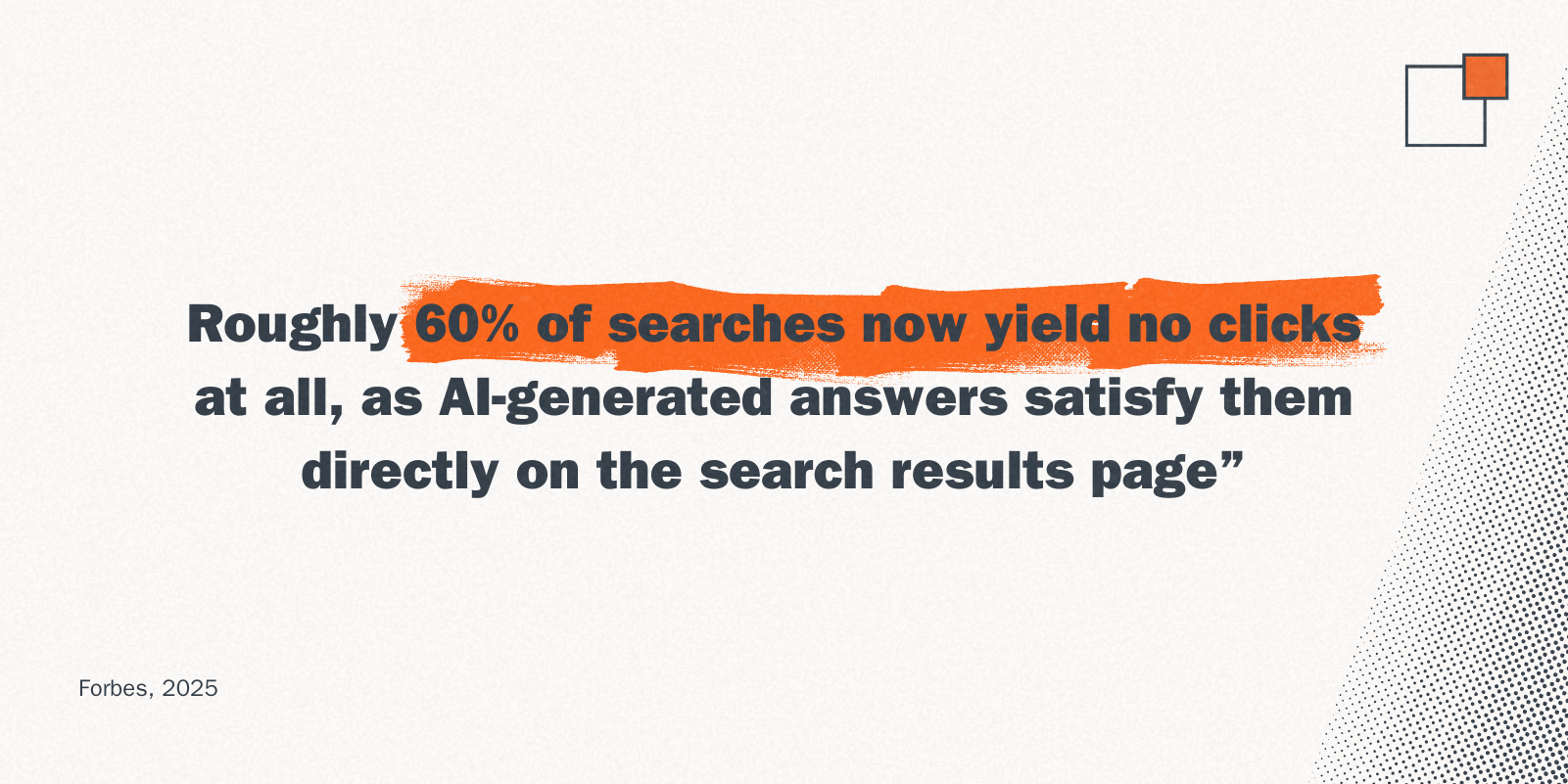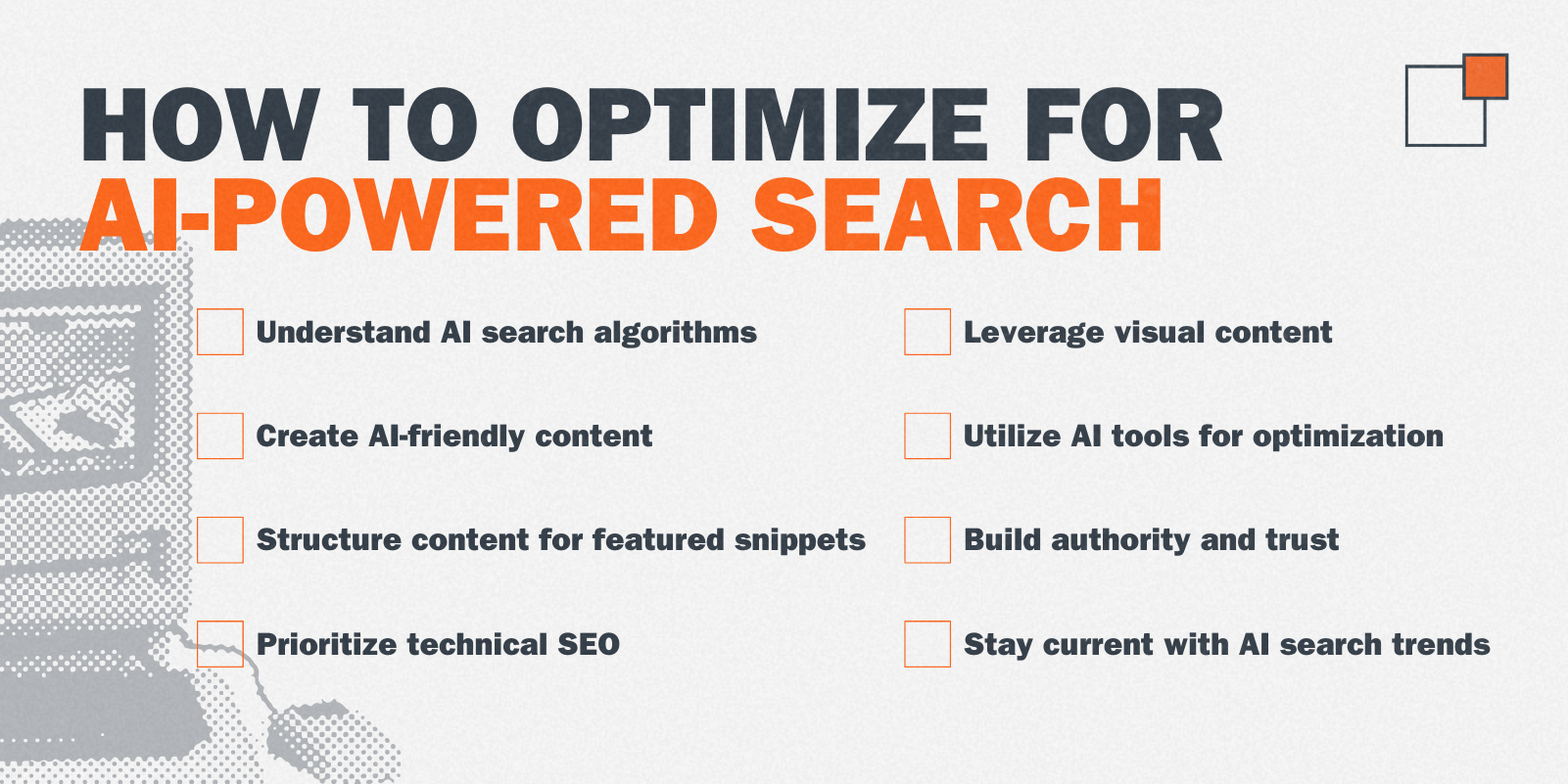AI Search & SEO:
Everything we know so far
“SEO is dead” is one of those lazy marketing hot takes that never quite dies.
Sure, ranking is harder. Google traffic may even be shrinking for some. The emergence of AI tools has made an impact on the way people search. And yes, social media platforms like TikTok are becoming go-to destinations for finding answers and information. But let’s not confuse change with disappearance.

The truth is, your audience is still searching—and arguably, they’re doing more of it. They’re asking questions, looking for recommendations and seeking out brands that feel relevant to them. The difference is how and where they’re doing it. It’s no longer just Google. It’s everywhere. It’s social. It’s AI.
So, no, SEO isn’t dead. It’s just not what it used to be. It’s evolving, and innovative brands are evolving with it.
Back when SEO first took shape, it was all about playing by Google’s rules. Success depended on keywords, backlinks and crawlability. Ranking well came down to how well you could match the language of your audience and prove your authority to a search engine.
As search evolved, so did the signals that mattered. The introduction of Google My Business in 2014 (now known as Google Business Profile) signaled a shift toward local intent and real-world presence. Location data, business hours, user photos and star ratings suddenly became SEO elements.
That shift wasn’t limited to brick-and-mortar businesses. Review sites like Yelp and TripAdvisor started influencing purchase decisions and organic performance. Schema markup became a way to tell Google what your page says and what it means. Search moved beyond the blue links and started offering rich results, knowledge panels, featured snippets and map packs.
What stayed consistent? Discovery. SEO has always been about earning a spot in the conversation at the exact moment someone is looking for something you offer. The tools, signals and platforms may have changed, but the goal hasn’t.
AI tools like ChatGPT, DeepSeek, Gemini, Alexa and even Google’s AI Overviews are reshaping how people search and how results are delivered. These tools rely on Large Language Models (LLMs) trained on vast amounts of data, and brands that don’t take this into account will be left behind.
We’re back at the point of discovery—but the platform has changed. In the same way we learned to optimize for Google, now we must learn to optimize for AI.
So, what does all this mean for your digital marketing strategy? If people are discovering brands through AI tools, your content needs to be discoverable by AI. That doesn’t mean abandoning everything you know about SEO—it means adapting it. Here’s how to get started:
Modern AI search engines go beyond keyword matching. They use natural language processing (NLP) to interpret context and user intent. Your content must reflect that shift—structured, contextual and written like a conversation to rank well.
Discovery no longer happens in one place. It’s not just your website, blog or even Google. Today’s search landscape is fragmented into two main categories: Factual and Reputational.
These sources help establish the facts about your business—your name, location, services, team, history and relevance. They feed both traditional search engines and AI training models, helping establish authority and verify credibility. Examples include:
These sources shape perception. They're where people talk about your brand and where potential consumers go to gauge trustworthiness. And more and more, AI is referencing them to inform summaries and guide decisions.
Is it harder to rank today? Yes, but ranking well always has been. SEO has never been easy, and the goalposts have always moved. What worked five years ago doesn’t cut it today, and what works now may shift tomorrow. But here’s the thing: people are still searching.
If you want to stay relevant, you have to evolve. Your content, visibility and strategy must keep pace with how your audience discovers information.
Need help evolving your strategy? At thunder::tech, we specialize in modern SEO, AI-ready content and technical optimization strategies that put your brand in front of your target audience.
Let’s talk about how to future-proof your search presence.

Sure, ranking is harder. Google traffic may even be shrinking for some. The emergence of AI tools has made an impact on the way people search. And yes, social media platforms like TikTok are becoming go-to destinations for finding answers and information. But let’s not confuse change with disappearance.

So, no, SEO isn’t dead. It’s just not what it used to be. It’s evolving, and innovative brands are evolving with it.
SEO has always been about discovery
Back when SEO first took shape, it was all about playing by Google’s rules. Success depended on keywords, backlinks and crawlability. Ranking well came down to how well you could match the language of your audience and prove your authority to a search engine.
As search evolved, so did the signals that mattered. The introduction of Google My Business in 2014 (now known as Google Business Profile) signaled a shift toward local intent and real-world presence. Location data, business hours, user photos and star ratings suddenly became SEO elements.
That shift wasn’t limited to brick-and-mortar businesses. Review sites like Yelp and TripAdvisor started influencing purchase decisions and organic performance. Schema markup became a way to tell Google what your page says and what it means. Search moved beyond the blue links and started offering rich results, knowledge panels, featured snippets and map packs.
What stayed consistent? Discovery. SEO has always been about earning a spot in the conversation at the exact moment someone is looking for something you offer. The tools, signals and platforms may have changed, but the goal hasn’t.
AI is the new search layer
AI tools like ChatGPT, DeepSeek, Gemini, Alexa and even Google’s AI Overviews are reshaping how people search and how results are delivered. These tools rely on Large Language Models (LLMs) trained on vast amounts of data, and brands that don’t take this into account will be left behind.
We’re back at the point of discovery—but the platform has changed. In the same way we learned to optimize for Google, now we must learn to optimize for AI.
How to optimize for AI-powered search
So, what does all this mean for your digital marketing strategy? If people are discovering brands through AI tools, your content needs to be discoverable by AI. That doesn’t mean abandoning everything you know about SEO—it means adapting it. Here’s how to get started:
1. Understand AI search algorithms
Modern AI search engines go beyond keyword matching. They use natural language processing (NLP) to interpret context and user intent. Your content must reflect that shift—structured, contextual and written like a conversation to rank well. 2. Create AI-friendly content
Write content that directly aligns with user intent. Go beyond surface-level answers. AI platforms favor clear, high-quality, engaging responses that fully address the question.3. Structure content for featured snippets
Use headings, bullet points and short, direct answers to common questions. These formats increase the likelihood of your content being pulled into AI-generated summaries or appearing in featured snippets on search engines.4. Prioritize technical SEO
Ensure your site is fast, mobile-friendly and uses schema markup. These factors help AI systems and search crawlers understand and categorize your content effectively.5. Leverage visual content
Unique images, charts, infographics and diagrams enrich your content. AI platforms like Perplexity often favor and cite sources with visual elements when generating answers.6. Utilize AI tools for optimization
Use AI-powered SEO tools such as Semrush or Ahrefs to analyze your site, evaluate readability, flag optimization gaps and simulate how your content may appear in AI summaries. These tools can help fine-tune your visibility strategy.7. Build authority and trust
AI models prioritize credible and trustworthy sources. That means high-quality backlinks, consistent content publishing and being cited in third-party, reputable publications all help your visibility.8. Stay current with AI search trends
The AI space is evolving quickly. Keep up with changes in how LLMs are trained, new tools entering the market and emerging best practices. Continuous learning = long-term visibility.Rethinking where discovery happens
Discovery no longer happens in one place. It’s not just your website, blog or even Google. Today’s search landscape is fragmented into two main categories: Factual and Reputational.

Factual data sources
These sources help establish the facts about your business—your name, location, services, team, history and relevance. They feed both traditional search engines and AI training models, helping establish authority and verify credibility. Examples include:
- Google Business Profile: Critical for local search visibility and providing accurate business information directly on the SERP.
- Wikipedia: Highly trusted by users and AI models, often cited in featured snippets and knowledge panels.
- Geographic and mapping databases: Help power location-based results, especially on mobile and voice search.
- Verified social handles: Offer credibility signals and context on brand activity, tone and public engagement.
- ZoomInfo, Bloomberg and Crunchbase: Essential for B2B visibility, especially when AI tools want to understand your business size, growth and industry role.
Reputational & UGC platforms
These sources shape perception. They're where people talk about your brand and where potential consumers go to gauge trustworthiness. And more and more, AI is referencing them to inform summaries and guide decisions.
- Reddit: A go-to place for raw, unfiltered opinions. AI tools like Perplexity have even begun citing Reddit threads in their outputs.
- Glassdoor: Not just for job seekers, your employer reputation can influence how people perceive your brand’s values and culture.
- Yelp, Facebook and Google Reviews: Reviews remain one of the most influential trust signals, and they feed directly into search rankings, map packs and LLM-generated responses.
Why SEO still matters
Is it harder to rank today? Yes, but ranking well always has been. SEO has never been easy, and the goalposts have always moved. What worked five years ago doesn’t cut it today, and what works now may shift tomorrow. But here’s the thing: people are still searching.
If you want to stay relevant, you have to evolve. Your content, visibility and strategy must keep pace with how your audience discovers information.
Need help evolving your strategy? At thunder::tech, we specialize in modern SEO, AI-ready content and technical optimization strategies that put your brand in front of your target audience.
Let’s talk about how to future-proof your search presence.
About the Author
Gabriella Caldwell is a Digital Marketing Strategist at thunder::tech. Outside of the office she can be found in a ceramics studio sculpting away, or visiting local art galleries.
